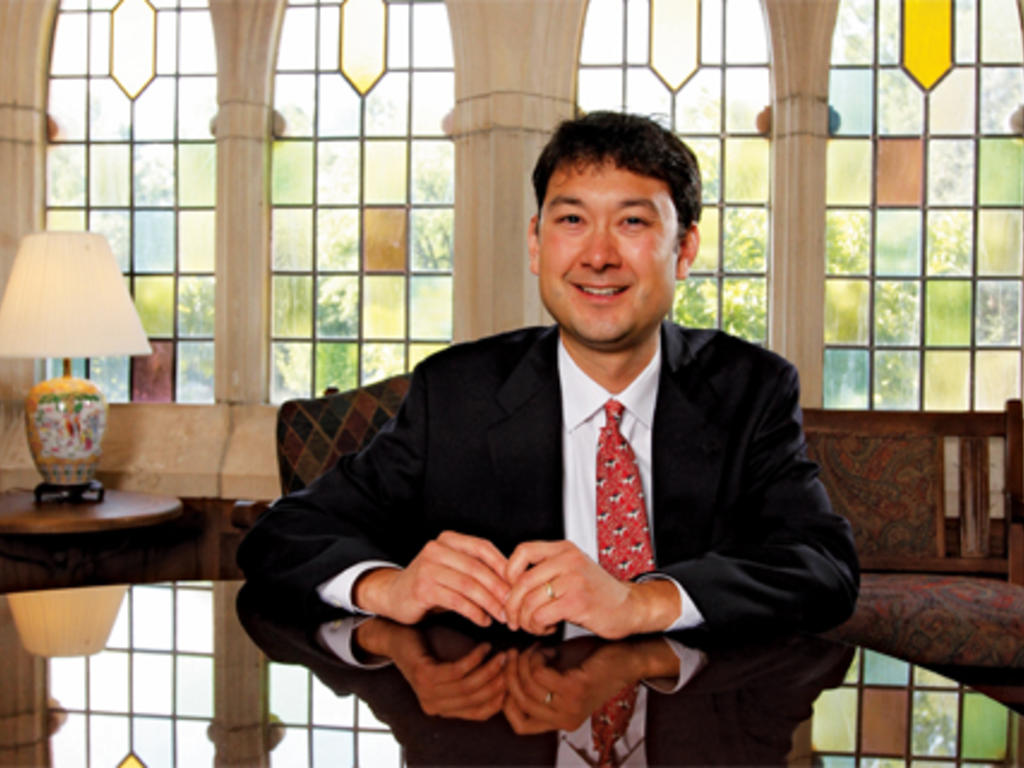By Richard J. Alley
Last year the joint department of Economics and Business split in two, becoming separate departments: One is now called Economics, the other, Business—in part because of the steady growth of each. The sheer size of the faculty and student body was such that, managerially, one department was becoming unwieldy.
Economics
Any liberal arts institution prides itself on a wellrounded education. It’s an education that is made up of literature, history, science, religious studies and the humanities. At Rhodes, the study of economics is increasingly gaining favor among students as a major of choice.
“Rhodes offers this classical liberal arts education and, on top of it, you add courses maybe in economics, accounting, finance and business, which makes our students very, very attractive to the market,” says Marshall Gramm, department chair of Economics.
“It provides a different way of thinking, a different way of analyzing people’s decisions and business’s decisions, and I really enjoy it,” says Alex Petraglia ’12 of his major in Economics.
The new Economics Department has taken the opportunity, with the inception of the new interdisciplinary major, Political Economy, to create an introductory Econ 100 course, combining the study of micro- and macroeconomics. The course gives students a basic foundation for understanding how our nation’s, and the world’s, economies work. “We encourage students from many different disciplines to take that first Econ course,” Gramm says. “It is heavy on intuition, but it’s less mathematical and technical; the mathematical and technical courses come next.”
Petraglia sees real value in the most basic class and recommends it for students from all segments of the college. “When you talk about what’s going on in the current environment, in terms of basic economics, it’s important to know how firms decide how much to produce, when to produce, when to shut down. It’s not just about profit, and Economics provides that.”
Make no mistake, Economics is a numbers-driven course of study with an emphasis on logical and quantitative analysis and communication skills, and Petraglia and his fellow students have learned the nuts and bolts of finance.
“Econ has gotten fairly mathematical, technical and statistically driven … it’s just the nature of the discipline,” Gramm says. “We teach statistics in our department and we teach econometrics, and a lot of our students go into pretty technical work in economic consulting. Many graduates head toward Washington, DC, to ‘get their ticket punched,’ and take work with such economic consulting firms as Welch Consulting and Keybridge Research. Those with an Economics-Math bridge major will mainly find themselves in graduate school. And then there are the locally-based financial institutions that are drawn to the graduates, so many of whom have taken part in internships around town. The Rhodes name carries a lot of weight in Memphis.”
Business
Department chair John Planchon likes to think of the undergraduate major in Business as somewhat analogous to an undergraduate MBA. There are no majors offered in any of the “functional areas of business,” Planchon says—not in marketing, accounting, finance or management—yet courses, introductory and advanced, from all those areas are offered within the major.
The confluence of all of those aspects will benefit senior Justin Lee, who chose the major as a way to better understand the workings—accounting, marketing, overall management and strategy—of his family’s jewelry business of 28 years.
Compared to business school students, Lee feels he’s “a lot more prepared than a lot of these other people, maybe not in one specific aspect like accounting or finance … but overall you learn leadership along with a lot of intangibles at Rhodes.”
Many of those intangibles can be found in real-world experiences and hands-on lessons such as Planchon’s ultimate field trip to Belgium each year to study international branding. It’s an experience that finds students touring breweries, FedEx Paris and the offices of diamond merchants to “learn more than they know they’re learning,” he says.
With its home in Memphis, Rhodes has the unique advantage of sitting literally and figuratively down the street from such worldwide corporations as FedEx, International Paper, AutoZone and many financial institutions. These entities, and the people who help run them, offer a means to step out of the textbooks and onto the production floor, enabling students to combine theory and practice.
“Our department has extraordinary relationships with those businesses,” Planchon says. “We have quite a few alums who are in those firms.” Those contacts are called on and, as a result, large numbers of students have received internships, have toured and had access to the main FedEx hub, along with speakers brought in to lecture on various aspects of business.
The split from Economics has allowed both majors to spread their wings and grow. There are currently 62 students majoring in Business or a bridge with Business. Part of this growth means a new position for an executive in residence, Richard (Dick) Fisher. Fisher, who has extensive business experience with Dunavant Enterprises and is a director of the Tudor Investment Corp. of New York, supervises the department’s internships and teaches the course, Internships and Professional Development, for Business majors. “One of our goals is for every Business major to have had considerable face time with Dick before they leave Rhodes. He works with them on their résumés, and helps them develop their interview skills as well as a clearer idea of their professional goals,” Planchon says.
“I think Rhodes’ effort to connect us with the Memphis community is really important. There’s a very big emphasis on having outside internships,” says Lee, who has interned at Morgan Keegan and ServiceMaster. “You’re learning in the classroom, but you’re also learning outside of it, connecting the two and, in many ways, I think that embodies a liberal arts education. We’re learning about everything as a whole.”
